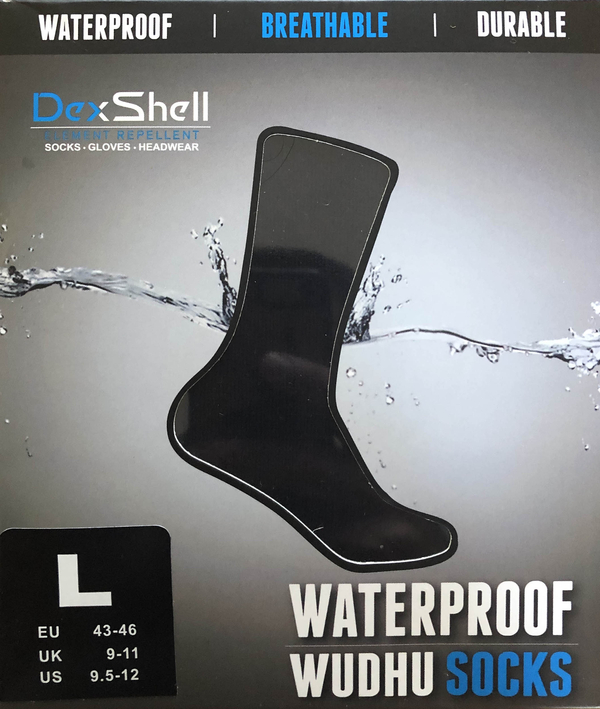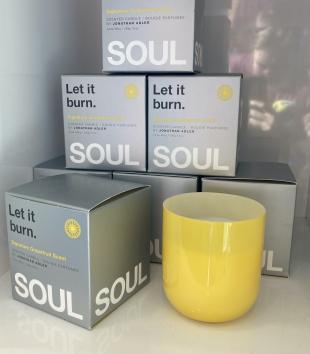Kambiz GhaneaBassiri is Thomas Lamb Eliot Professor of Religion & Humanities at Reed College and a 2022 Benedict Distinguished Visiting Professor at Carleton College. He is also a Senior Fellow of the Material Economies of Religion in Americas project at MAVCOR and the author of A History of Islam in America: From the New World to the New World Order.
This is a pair of waterproof socks originally designed for hiking and mountain biking that have been rebranded primarily for the American Muslim market as “wudhu socks.” Islamic Horizons, a premier American Muslim magazine published by the Islamic Society of North America (ISNA), explains the market demand that the owner of its distributing company perceived and sought to fulfill with these ablution socks:
While on his cellphone store showroom floor catering to customers, Long Island native Fahad Tirmizi found himself having to answer another call—his daily prayers. So, excusing himself from the floor, he punched in the code on the lock and made his way through the “Employees Only” door to begin his routine: go to the office, remove socks and shoes, put on flip flops, walk to the bathroom, make wudu’, wash feet in sink, go back to the office, dry feet and finally, pray. The post-prayer routine consisted of ensuring his feet were absolutely dry before putting on his socks and shoes and returning to the sales floor.1
The article goes on to speculate that this is a widespread problem among Muslims whose religious needs are not materially accommodated in American public life: “Many Muslims face this struggle in the workplace. Aside from the awkward encounter that ensues when a non-Muslim sees a Muslim washing his or her foot in the sink, just preparing for the prayer can be quite time consuming.”2
In supplying a market-based solution to a seemingly practical American Muslim problem, the makers of “wudhu socks” not only seek to facilitate ritual prayer but also promote Muslim entrepreneurship. The company has a “reseller program” through which they invite individual Muslims to buy their socks wholesale and resell them at mosques or Muslim stores. This “is not only a great way to help Muslims around the United States and Canada,” the advertisement for the program states, “but with an estimated 3.5 millions [sic] Muslims in North America, it is a lucrative business opportunity as well.”3
These socks are marketed as a “Shari‘a-compliant” alternative to the khuffs that Prophet Muhammad wore on his feet when, rather than washing his feet during the minor ablution (wuḍū’) for ritual prayers (ṣalāh), he wiped his covered feet with wet hands. This controversial dispensation (rukhṣa) in Sunni jurisprudence (fiqh) is known as masḥ ‘alā al-khuffayn or wiping over footwear. The socks’ distributing firm explains:
It is narrated in the hadith of Al-Mughirah bin Shu‘bah…, who said that the Prophet …made wudhu. Al-Mughirah said, ‘I moved to remove his khuffayn and he said, “Leave them, for indeed my feet were in a state of purity when I wore them.” So he wiped over them.’ Theerefore it is better for one wearing Khuffayn to wipe over them, rather than taking them off to wash his feet. And that which explains when one should wipe the feet and when one should wash them is the Sunnah [normative prophetic tradition], for the Messenger…used to wash his feet when they were uncovered, and wipe over them when they were covered by khuffayn.4
To show that “wudhu socks” can be used in place of khuffayn and therefore allow modern American Muslims to emulate Muhammad in performing masḥ ‘alā al-khuffayn, their distributor consulted Darul Iftaa Mahmudiyya in Zambia, an online fatwa service provider that specializes in addressing the validity of business practices according to Islamic legal principles (Shari‘a). Darul Iftaa Mahmudiyya provided the distributor with a fatwa attesting to the “Shari‘a compatibility” of the socks:
After conducting a durability test on them by walking the necessary three Shar‘i miles,5 as well as conducting a water resistance test and a test to ascertain whether the socks are able to stand on the legs without being fastened or tied, we are satisfied with the results and deem them to be fit for Masah (wiping over) during Wudhu.6
The socks were able to meet these stringent requirements because they consist of a fusion of three layers of highly engineered fabrics: an outer layer that is mostly nylon, an inner layer made out of cotton with some nylon, and a waterproof interlining. A pair retails for about $30. The present pair was purchased at a discount from a booth at the bazaar of the 2016 annual convention of the Islamic Society of North America held in the Donald E. Stephens Convention Center in the suburb of Chicago. In 2020, the distributing company’s revenue was estimated at $100,911—not an insignificant amount for a small business with two employees on record, but certainly not enough of a market for DexShell, an international sportswear company that originally manufactured the socks to retail them on its own website under its own brand to American Muslims.7 At present, these socks are also not readily found in mosques or Muslim stores in United States and Canada. Despite their distributor’s claim that there is a “lucrative” market for wuḍū’ socks in North America, the truth of the matter is that such a market does not exist as of yet. If wuḍū’ socks are going to be a “lucrative opportunity” for American Muslim entrepreneurs, a market for them has to be created.
My interest in these socks lies in the fact that as a product embedded in the Neoliberal logic of the marketplace, “wudhu socks” exemplify an effort to Islamicize the consumptive habits of American Muslims. When I contacted the distributors to ask what makes “wudhu socks” different from the waterproof trail socks available on the original manufacturer’s website, they informed me that the fatwa approving the socks for masḥ was based on tests conducted on their socks to make sure they meet the criteria of the Prophet and his companions’ footwear.8 Yet, they are also careful to show that they are not selling ancient, uncomfortable leather socks. In addition to consulting “scholars about what the requirements [of masḥ ‘alā al-khuffayn] are,” they explain to potential customers that “we did a lot of legwork” making sure “quality” and “comfort” were not “sacrificed by meeting those criteria.”9 The selling point being that were it not for the technology of “wudhu socks,” Muslims who want to be assured they are adhering to Islamic ritual purity laws would have to sacrifice the comfort of their feet by wearing leather socks or they have to experience the discomfort of washing their feet in sinks of workplace or public bathrooms.
For this marketing tactic to have traction, the varying Islamic traditions and practices that address issues regarding the cleanliness of feet for prayer and the role of shoes in maintaining ritual purity need to be reduced to a singular set of criteria—a checklist—that an object could satisfy. In the marketing of “wudhu socks,” then, we have an interesting window onto how the forces of consumer capitalism in twenty-first-century America are brought to bear on a centuries-old hermeneutical, legal, and theological tradition in Islam that has long conceptualized purity through embodiment and objects.10 This intellectual and embodied tradition dates back to the time after the demise of Muhammad when Muslims debated how to best emulate the prophet in their ablutions given the varying details of the sources available to them. The so-called wuḍū’ verse in the Qur’an (5:6) was read differently depending on how Muslims remembered the case endings for “your feet” (arjulakum/arjulikum) in the verse. If one reads “your feet” to be genitive, then the verse reads: “O those who believe! When you are going to stand for ritual prayer, wash your faces, and your hands up to the elbows, and wipe your heads and your feet up to the ankles.” If “your feet” is read in the accusative, then the verse would read: “Wash your faces, and your hands up to the elbows, and wipe your heads, and wash your feet up to the ankles.” This verse engendered controversy soon after Muhammad’s death because it pit the prophetic tradition or Sunna of washing one’s feet for ablution against the text of the Qur’an.11 As the Prophet’s cousin ‘Alī b. Abī Ṭālib is reported to have observed, “The Scripture imposed the wiping of the feet; the Sunna washing.”12 The Imāmī Shi‘a and the Khawārij accepted the genitive reading of the verse. They argued that the Qur’an supersedes the Sunna. And because they did not recognize the washing of feet as a necessary part of wuḍū’, they also did not accept masḥ ‘alā al-khuffayn as a valid practice. Furthermore, they argued that the Qur’an specifically refers to the cleaning of feet, not footwear.13
Sunni Muslims, on the other hand, accepted the washing of feet as an obligatory Sunna, but they also believed that Muhammad often wiped his khuffs rather than wash his feet. Their debates thus focused on what type of footwear exactly would permit one to not wash one’s feet and on what conditions would make masḥ ‘alā al-khuffayn permissible.14 Contrary to what the marketing material for these “wudhu socks” suggests, the Arabic word khuff does not refer to socks but to foot covering more generally. A more complete account of the al-Mughīra b. Shu‘ba ḥadīth to which the marketers of “wudhu socks” refer, states:
While on a journey I stayed during a certain night with the Prophet. He asked me whether I had water with me. Upon my affirmative answer he descended from his camel and walked away until he had disappeared in the dark night. After his return I poured from the water skin so that he could wash his face. Since he was wearing a woolen garment from which he could not stretch out his arms, he stuck them out from under its hem and washed them and wiped (with his hand) over his head. Then I bent down to undo his khuffs, but he said: ‘Let them be, I put them on while my feet were clean.’ Then he wiped over his khuffs.15
Khuffs mentioned in this ḥadīth can plausibly be read to refer to any modern-day shoes that cover the feet up to the ankle—the parts of the feet that one needs to wash during wuḍū’. If read as such, the question arises as to why Muslims would need special socks in order not to have to wash their feet for wuḍū’. Indeed, many American Muslims simply do wipe over their short boots rather than wash their feet when at work. Moreover, the full text of the ḥadīth also suggests that the use of masḥ ‘alā al-khuffayn may be limited to when one is traveling and cannot easily wash one’s feet. The Prophet’s actions can further be read as demonstrating a concern for wasting water under conditions when that precious resource may be scarce.
Without getting mired down in the details of the debates regarding masḥ ‘alā al-khuffayn, my point is that masḥ ‘alā al-khuffayn is subject to interpretation and has been debated among Muslims for centuries. At stake in these debates has been the relationship between the Qur’an and the Sunna as well as the nature of the qur’anic text itself (How should Arabic grammar be interpreted in the context of the Qur’an?). Importantly, these debates have not been confined to the sphere of religious specialists but have been embodied in Muslims’ everyday practices and in their footwear. These “wudhu socks” are a reminder of how legal and theological discourses of the gravest import in Islam have always included objects and bodies. A material analysis of them thus cannot take place without consideration of the discursive traditions that have historically shaped Muslim lives. These discursive traditions and their embodiment in the actions and objects involved in the performance of the wuḍū’ together limit the extent to which the forces of consumer capitalism can shape American Muslim identities. That “wudhu socks” remain a novelty and are not widely found in Muslim stores and homes attests to the continuing relevance in American Islam of the embodiment of complex epistemological, theological, and sociopolitical debates, despite the assimilative forces of the market.
- 1Habeeba Husain, “N.Y. Muslims’ Businesses Solve Everyday Problems,” Islamic Horizons, March/April 2018, 42.
- 2Ibid.
- 3WuduGear, accessed September 6, 2020, https://wudugear.com.
- 4“About Us,” WuduGear, accessed August 10, 2020, https://wudugear.com/pages/about-us/. Italics are in the original and mark the translation of the ḥadīth. The rest of the citation is the company’s commentary on the ḥadīth.
- 5This refers to a rule that some Sunni jurists (fuqahā) have deduced from the Ḥadīth. The rule is summarized in the fatwa as “They should be durable enough that a person can walk with the sock for three miles without them tearing to the extent of three small toes.” “About Us: WuduGear Socks Fatwa,” WuduGear, accessed August 10, 2020, https://wudugear.com/ pages/about-us/.
- 6“About Us: WuduGear Socks Fatwa,” WuduGear, accessed August 10, 2020, https://wudugear.com/ pages/about-us/.
- 7“Wudu Gear Inc.,” D&B Duns Market Identifiers Plus (US), June 15, 2020, https://advance-lexis-com.proxy.library.reed.edu/api/document?collection=company-financial&id=urn:contentItem:5Y92-YWG3-D533-D564-00000-00&context=1516831.
- 8Email communication through the company website, July 17, 2020.
- 9Husain, “N.Y. Muslims’ Businesses,” 42.
- 10See Marion Holmes Katz, Body of Text: The Emergence of the Sunnī Law of Ritual Purity (Albany, NY: State University of New York Press, 2002).
- 11Katz, Body of Text, 75-86.
- 12Abū Zakariyya Yaḥyā b. Ziyād al-Farrā’, Ma‘ānī al-Qur’ān, ed. Aḥmad Yūsuf Najātī and Muḥammad ‘Alī al-Najjār, vol. 1 (Cairo: al-Hay’a al-Miṣriyya al-‘Āmma li-l-Kitāb, 1980), 302.
- 13John Burton, “The Qur’an and the Islamic Practice of Wuḍū’,” Bulletin of the School of Oriental and African Studies 51, no. 1 (1988): 30.
- 14G. H. A. Juynboll, “(Re)Appraisal of Some Technical Terms in Ḥadīth Science,” Islamic Law and Society 8, no. 3 (2001): 335-341; Burton, “The Qur’an and the Islamic Practice of Wuḍū’”; and Charles Pellat “al-Masḥ ‘Alā ‘l-Khuffayn” in Encyclopaedia of Islam, 2nd ed., ed. P. Bearman, Th. Bianquis, C.E. Bosworth, E. van Donzel, and W. P. Heinrichs (Leiden: Brill, 1960-2007).
- 15Cited in G.H.A. Juynboll, Encyclopedia of Canonical Ḥadīth (Leiden: Brill, 2007), 468. See also Juynboll, “(Re)Appraisal of Some Technical Terms in Ḥadīth Science,” 340.
Notes
Keywords
Imprint
10.22332/mav.obj.2021.6
1. Kambiz GhaneaBassiri, "Ablution Socks," Object Narrative, MAVCOR Journal 6, no. 2 (2022), doi: 10.22332/mav.obj.2021.6.
GhaneaBassiri, Kambiz. "Ablution Socks." Object Narrative. MAVCOR Journal 6, no. 2 (2022), doi: 10.22332/mav.obj.2021.6.




